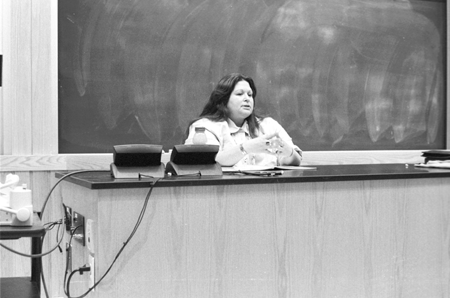|
Native
American Activist Stormy Ogden Speaks on Prisons
by Katrin Welch
 Thirty
people sat solemnly Wednesday night as speaker Stormy Ogden framed
the story of Native Americans in American prisons, a story that
involves decades, several varieties of iron bars and great suffering. Thirty
people sat solemnly Wednesday night as speaker Stormy Ogden framed
the story of Native Americans in American prisons, a story that
involves decades, several varieties of iron bars and great suffering.
As part of the second annual Indigenous Women’s Lecture Series,
Ogden spoke to the people assembled in Craig Lecture Hall about
the imprisonment or “prisonification” of Native American
women by the American government. She painted a dramatic picture,
even when she was simply listing statiscal information:
Between 1986 and 1991 there was a 430 percent increase in female
incarceration.
Two thirds of the women in prison today are from a racial minority
group. Forty percent of the women in prison report being abused
in some way prior to their arrest. One in three women in prison
were arrested on drug charges. Women imprisoned for violent crime
were twice as likely as men to have targeted someone close to them.
Ogden colored these numbers by explaining that most of the women
in prison are there for drug abuse, poverty crimes such as food
stamp fraud or violence against their abuser. This is especially
devastating to Native American communites since a majority of Native
Americans live in poverty and a large proportion suffer from drug
abuse.
For a community already struggling to stay solid, the imprisonment
of so many Native Americans is particularly threatening, Ogden said,
pointing out that prison is punitive and runs on a structure of
social control, rather than rehabilitation. Consequently, Native
Americans return from prison angry and bitter, further challenging
the health of the tribe. It is for this reason that Ogden has taken
up the cause of rehabilitation of Native women after their prison
sentences.
Ogden has a particularly poignant reason to be concerned about Native
women in prison: she was one. After spending five years in the California
Rehabilitation Center, she was sent to a state prison where, clean
and sober, she formed a community with the other indigenous women,
creating the first American Indian group in any prison. She followed
this by building the first sweat lodge in any prison.
After being released, Ogden became an activist for Native Women’s
rights in prison, and for the rights of her people in general. She
wrote The American Indian in the White Man’s Prisons: A Story
of Genocide and is currently fighting the New Age consumerizaton
of sweat lodge ceremonies. “I have fun with that,” she
said. “I like going toe to toe with those people.” Ogden
also helped found White Bison, a house for sobriety and “well-breity”
for Native Americans. Additionally, she works to change the names
of all places that use the name “Squaw” in California,
particularly the Squaw Valley ski area in Lake Tahoe. She offered
her support to those people in this area who are fighting to change
the name of the Cleveland Indians. “I know it’s frustrating,”
she says, “but keep trying!”
|



